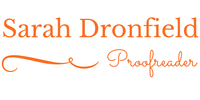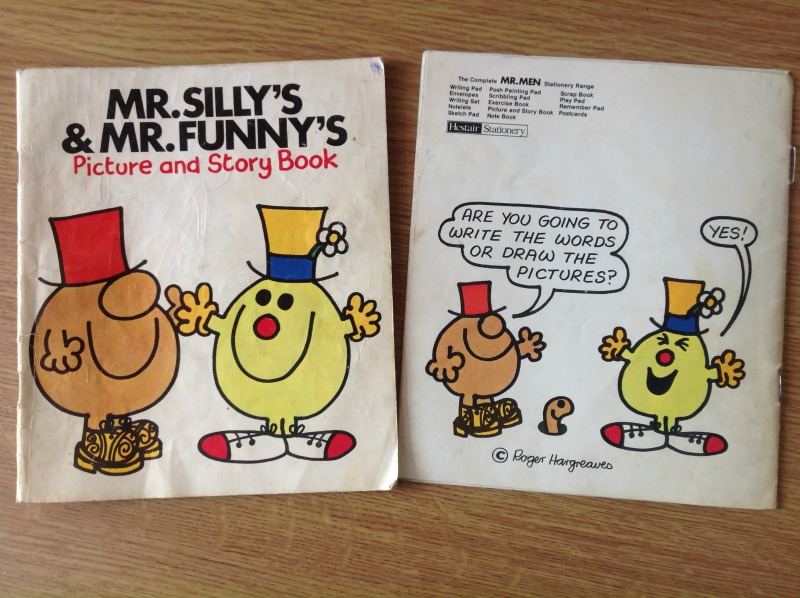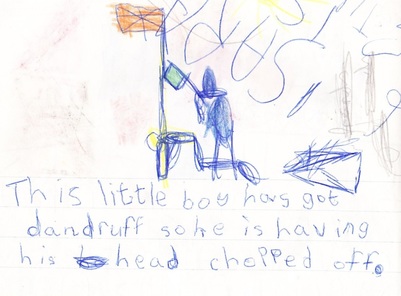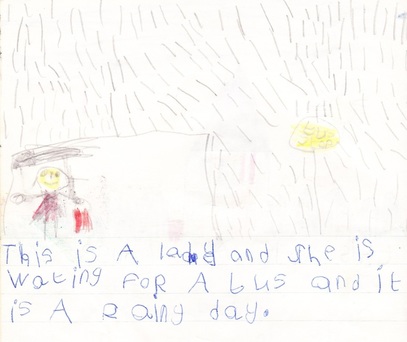|
When I was a child, around the age of five or six, I used to write a lot of stories. I had Mr Men exercise books and filled one after another with ‘illustrated’ stories. When I was eight, I started writing a book called The Long-Lost Wizard (J.K. Rowling, eat your heart out). I never finished it, and I only wrote stories occasionally after that. It's odd because my parents, understandably, thought that I would grow up to become a novelist; however, that path lay ahead of my brother instead. Although he didn't write as much as I did while we were growing up, his preference for the darker side of storytelling was already showing itself even in those days (you can see a charming example below, which he left in one of my exercise books). In comparison, my stories almost always began with the words, ‘It is a sunny day…’. We weren’t exactly the Brontë sisters. An example of Jeremy Dronfield's early work In later childhood, the only writing I did voluntarily on a regular basis was to keep a diary, which I continued to do most years until the age of 30 when I gave up my job, sold my house and went travelling, and then I kept a detailed journal of my adventure. (I definitely have to get that typed up one day, if only for backup purposes.) The only story I ever wrote in which the weather was inclement (and, yes, it would have benefited from being proofread) Looking at them now, I find that most of my stories were actually an early form of diary-keeping: a story about playing with my friends; a story about going to the park; a story about going on a holiday or a school trip. Apart from The Long-Lost Wizard, my stories lacked imagination. So, instead, I discovered reading and lost myself in other people's imaginations and the world of books.
In the beginning it was mostly Enid Blyton’s stories of the Faraway Tree, the Secret Seven and the Famous Five. My brother encouraged me to have a go at The Hobbit, but I'm afraid I couldn't get past giggling at an illustration of Bilbo Baggins’ feet. Childish I know. Well, to be fair, I was a child. I didn't just love the stories, though; I loved the books themselves: how they felt in my hands, the look of them; and not necessarily just because of an interesting cover, but because of how the words looked on the page: the layout, the font, how they worked with the illustrations (Bilbo Baggins’ feet notwithstanding). As I got older, however, I started to notice when things weren't quite right. It wasn't always enough to spoil my enjoyment of a good book, but it would definitely distract me, throwing me out of the book and back into the real world with a jolt. I would keep going back to any error I found, and I would wonder how it had happened, and think what a shame it was, and that I'd love to be able to do something about it. But how? I had no idea. I've had, shall we say, quite a varied career spanning 20 years, including mortgage admin, archaeology, and motherhood. It's motherhood which has at last propelled me into a career as a proofreader. I had to find something I could do from home. I had to bring some much-needed order into my life to offset the chaos that ensues after having a baby. And what better way than, finally, to gain some satisfaction by preventing errors from appearing in print or on screen? I might not have been able to fathom how to go about becoming a proofreader when I was in my teens and early twenties, but now in my early forties and with the help of the Internet, I have found it relatively easy to do so. I quickly found out that the best course of action for me would be to take the Publishing Training Centre’s Basic Proofreading by Distance Learning course. And, oh, what satisfaction I discovered indeed when settling down with my red and blue pens to attack a page full of errors! I passed the course with merit. Only counting the weeks when I actually spent time working on the units and assignments, it took me around eight months to complete the course. Since then I’ve been busy setting up my proofreading business and finding my first clients. I wouldn't have been able to do this without the invaluable resources of the Society for Editors and Proofreaders (of which I am now a member) and Louise Harnby’s books on business planning and marketing for editorial freelancers. I feel I've finally found the job I was always meant to do. Although, even if I could, I wouldn't alter the path that led me to this point. Apart from the fact that I enjoyed every minute, the qualifications and experience I picked up along the way mean that I have both general and specialist knowledge that gives my clients extra confidence in my abilities to handle any work I undertake for them, because I am able to spot factual as well as grammatical errors. So was I born to proofread? I don't think that would make a very good song title, but perhaps it's true all the same. I don't think I was born to be a writer in any case, apart from being an avid diary-keeper. Does that mean I'll make a good blogger? I guess we're about to find out...
6 Comments
15/8/2016 01:45:35 pm
Hi, Sarah.
Reply
Sarah Dronfield
15/8/2016 04:43:18 pm
Thank you, John. I hope I can stick at it. Yes, my brother is a good sport for letting me publish the 'dandruff execution' tale! I hope your daughter enjoys the Faraway Tree books as much as I did.
Reply
Julia Banks
15/8/2016 06:13:31 pm
Great first blog! Now we both have to tackle that difficult second blog . . . I am thinking of actually calling mine that. I'm looking forward to chatting to you more in the near future, as we are both at the same stage of our career path so can exchange tips. PS: I need to find out how you got the Facebook like option on your blog!
Reply
Sarah Dronfield
16/8/2016 11:12:06 am
Thank you :-) And yes, we need to keep in touch, and hopefully meet in person at the next SfEP local group meeting.
Reply
16/8/2016 02:10:27 am
Fabulous! I know just what you mean about mistakes in literature being jarring. I had a similar epiphany when reading "Catcher in the Rye" as a teenager (as one does). Was Ackley's roommate called Ely, or Herb Gale? Clearly Salinger wasn't sure! At least, though, in that particular book the grammar could be blamed on the protagonist's declining mental state rather than the author!
Reply
Sarah Dronfield
16/8/2016 11:24:07 am
Thanks Kim :-) With your eye for detail, which has always impressed me, you could be a proofreader, if you weren't already a talented music teacher. However, perhaps you could do both; this may be of interest to you: http://www.sfep.org.uk/training/choose-a-course/editing-and-proofreading-music
Reply
Your comment will be posted after it is approved.
Leave a Reply. |




